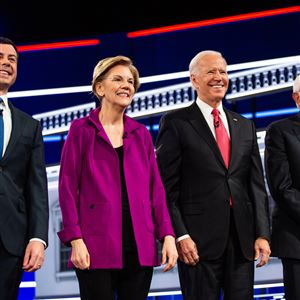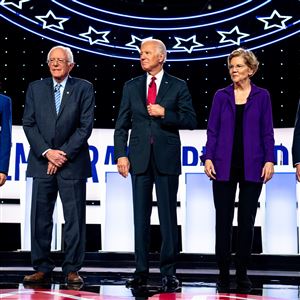The conversation that spawned the idea to hold a forum on education for Democratic presidential candidates in Pittsburgh took place months ago at the American Federation of Teachers building in Washington, D.C.
But grassroots organizations, teachers unions and public school advocacy groups in Pennsylvania and around the country have for years been laying the groundwork that they hope will make education a key issue in the 2020 presidential race and beyond.
“You see the difference about the importance of public education right now,” said Randi Weingarten, president of the American Federation of Teachers. “As the world gets more complicated and complex, and there’s such division outside of schools, public schools become even more important.”
The Public Education Forum 2020 being held Saturday at the David L. Lawrence Convention Center in Downtown, will provide an opportunity for many of the leading candidates to air their stance on some of the major issues facing public education today.

Pittsburgh Post-GazetteDemocratic presidential candidates to face key education issues at Pittsburgh forum
The forum was convened by an 11-organization coalition of groups that included the American Federation of Teachers, the Pittsburgh Federation of Teachers and social justice advocacy group One PA, among others. Candidates scheduled to appear at the forum include Vermont Sen. Bernie Sanders, Massachusetts Sen. Elizabeth Warren, former Vice President Joe Biden, South Bend, Ind., Mayor Pete Buttigieg, Minnesota Sen. Amy Klobuchar and businessman Tom Steyer.
The idea to hold a forum was sparked during a conversation in early spring in Ms. Weingarten’s office in Washington between her and a group of public education advocates. The group decided to brainstorm ways that they could bring public education issues to the forefront of the 2020 presidential race, and they eventually came up with hosting a forum where candidates could hear from a variety of stakeholders — teachers, parents, students, unions and more — and at the same time talk about their own views.
One of the people who was at the meeting was Jitu Brown, the national director of the Journey for Justice Alliance, a grassroots group based in Chicago with partners nationwide that calls for education equity.
The Journey for Justice Alliance promotes student-centered school climates, sustainable community schools and teacher diversity as well as more accountability for charter schools, limits on using standardized tests as measures of school success and ending zero-tolerance policies. The organization launched in 2012 in an attempt to combat what members saw as the growing problem of school privatization.
The Journey for Justice Alliance collaborates with student, parents and teacher groups, as well as the likes of the NAACP and Black Lives Matter. As planning for the forum began, Mr. Brown approached the leadership of many of those organizations to ask for their involvement.
“We understood that together we represented millions,” Mr. Brown said, “and that divided, we’ll win victories here and there, but united, we can change how education operates in the United States.”
Mr. Brown said bringing together so many organizations with different needs — and that often disagree on issues — will force the candidates to answer questions from those who do not always have a voice: the teacher worried about resources being depleted from her school, the parent who’s had to send her child to three schools in three years, the student who’s late to class because he had to wait in line to go through the metal detectors.

Pittsburgh Post-GazettePittsburgh will host leading Democratic presidential candidates for education forum
Though Mr. Brown has been outspoken about the privatization of schools being pushed by Betsy DeVos, President Donald Trump’s education secretary, he said Democrats are also to blame for the decline in public education. He said he believes that there would be no Betsy DeVos without Arne Duncan, an Obama administration secretary of education who pushed for standardized tests and promoted charter schools.
Mr. Brown said he feels as though Democrats have abandoned President Lyndon Johnson’s Title I under the Elementary and Secondary Education Act of 1965 that aimed to close the skills gap between low-income students and middle-class or more affluent students. He said he also feels as though the Supreme Court’s ruling on Brown v. Board of Education, which banned segregation in schools, never has been fully realized.
He hopes the forum will open a conversation about education equity that will continue as the election approaches.
“We want a presidential candidate to have to talk to the full breadth of the education justice movement, and then also that education justice becomes a wedge issue in the presidential election,” he said.
Why Pittsburgh?
Another matter as the forum came together was agreeing on a location. Chicago, Detroit and Boston were all under consideration, but the organizers settled on Pittsburgh for a number of reasons.
First, Pennsylvania is a battleground state that Mr. Trump won in 2016. Pittsburgh and Western Pennsylvania are important areas for Democrats to have a high rate of success if they want to reclaim the state in 2020.
Pennsylvania also deserves credit for pushing education justice, according to Mr. Brown. OnePA, in particular, has been leading the charge for education equity. For example, members of OnePA last week urged the Pittsburgh Public Schools to shift funding away from police and security and allocate more money toward mental health services for students.
“Based off of the work that we’re doing here locally, we are actually looked at as a city that is moving forward to more progressive education policies, specifically around ending the school-to-prison pipeline and creating new sustainable community schools, [and] making sure that we’re not privatizing our education by supporting new charter school applications,” said Angel Gober, the Western Pennsylvania director of OnePA.
Pittsburgh also “represents diverse students and families like in so many other places across the country,” Ms. Weingarten said. “Basically, working people who see public schools and college as a way of achieving the American Dream.”
Nina Esposito-Visgitis, the president of the Pittsburgh Federation of Teachers, said she is “proud” that the city is getting the chance to host the forum.
“It is a lot of work, but we’re really very, very excited,” Ms. Esposito-Visigitis said. “We’re very excited to of course show off our city, and show off the work of our local and the work we do here in education.”